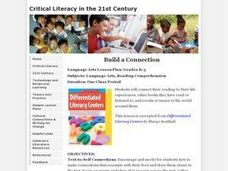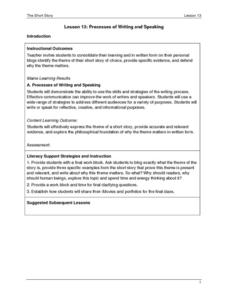EngageNY
Inferring About Characters Based on How They Respond to Challenges (Chapter 4: "Los Higos/Figs")
How do you know what a character's personality is like if an author doesn't tell you? With a focus on character development in Esperanza Rising, pupils complete a jigsaw activity to analyze the actions of Mama, Abuelita, and Miguel. Once...
Teaching Tolerance
Using Photographs to Teach Social Justice | Exposing Homelessness and Poverty
Photos can capture a complete story in a single image. Class members closely examine a photo of a homeless camp and attempt to read the story told by the picture. They then read the caption for the photograph and compare their notes with...
EngageNY
Relationships Between Key Scientific Concepts: Planning What Causes Earthquakes
That is ground shaking news! Scholars read Earthquake in multiple reads to determine the gist, identify cause and effect relationships, and understand vocabulary. Learners complete graphic organizers to describe what happens before and...
National Endowment for the Humanities
La Familia
Young scholars identify at least one country where the Spanish language is spoken, describe similarities and differences between Spanish, Mexican, and Puerto Rican families, and practice speaking the Spanish words for several family...
Curated OER
The Civil War
Although we currently focus on Abraham Lincoln's positive contributions in creating a more equal society, the truth is that Lincoln was actually a controversial character in his time! After studying the Civil War, give your high...
Achieve3000
Figurative Language
Similes and metaphors make writing more beautiful and detailed, but can be a little harder to decipher during a first reading. Use a passage from The Man Who Loved Words to show young readers how to think through passages that...
Curated OER
Analyzing Literary Devices
Eighth graders identify figurative language and poetry in this literary analysis lesson. Using Through the Looking Glass by Lewis Carroll and a YouTube video for "The Walrus and the Carpenter," young readers complete a literary device...
Curated OER
Build a Connection
Learners discuss their personal connections with stories they've read in the past and identify techniques to connect with more stories. They create illustrations, construct task cards, and complete sentence stems based on books they read...
Curated OER
Vocabulary Instructional Routine: Multiple Meaning Words in Context
Tackle multiple-meaning words with your youngsters using this scaffolded lesson which features a detailed script. Begin with the word shoulder, using context clues to help scholars understand the meaning. Next, they observe a second...
Speak Truth to Power
Abubacar Sultan: Children’s Rights
This is an excellent resource for introducing and exploring the topic of child soldiers. Ethics, history, or theology classes will benefit from the high-quality information. This includes detailed instructions for an introductory...
Google
Beginner 4: Searching for Evidence for Research Tasks
Having a strong searching skill set can make a research project much easier and much for successful for pupils. Tackle finding evidence with the ideas included here. The ultimate goal is for class members to learn the stepping stones...
Maine Content Literacy Project
Processes of Writing and Speaking
As this short story unit comes to a close, provide a day for a full examination of theme and allow some time in class for individuals to work on their various assessments. This final lesson before presenting iMovies and portfolios is the...
University of North Carolina
Audience
Challenging pupils' perspectives by having them walk in the shoes of the reader. An informative resource discusses how to identify an audience and anticipate their needs before writing an upcoming argumentative essay.
Reed Novel Studies
No Talking: Novel Study
Many of the world's most inspirational sayings are attributed to Mahatma Gandhi. Using the No Talking novel study, pupils research and write about one of his sayings. Additionally, they practice alliteration and write a quintet that...
EngageNY
Tracing and Evaluating Arguments: “The Future of Water” and The Big Thirst
Can scholars predict the future? They try as they first watch the video The Future of Water to capture details and trace the argument. Next, individuals complete the Tracing an Argument
note catcher to guide their thoughts. To...
Curated OER
Identify That Culture
Students view various types of artwork and try to identify the culture being represented. Using a worksheet, they answer questions based on the artwork and the artist's use of color and technique. They research the artist's country of...
Curated OER
Observation
Students practice observation skills by discussing physical attributes of family artifacts. They determine what characteristics of an object are considered important details.
Curated OER
Identifying and Describing Story Elements
First graders examine how to identify the different elements of a story and how they fit in a definite sequence. The use of comprehension skills is essential to retell the story as desired within the lesson.
Curated OER
Past and Present Tense
Students make predictions about the coming up chapter in their book. Students are introduced to new vocabulary words and definition for this new chapter. Students create a table where they can input the new vocabulary word, definition...
Curated OER
The Spotted Owl
Second graders explore using nonfiction text to gain information. Working in pairs, 2nd graders read an article about the spotted owl. Each group identifies the main idea and supporting details of their text and use this information to...
Pennsylvania Department of Education
Exploring Key Ideas and Details in Fiction and Nonfiction
Third graders participate in activities to differentiate fiction from nonfiction. In this fiction lesson, 3rd graders describe the elements of a fiction story. Students compare and contrast fiction and non fiction elements....
Curated OER
Build a Tasty Sandwich
The subject doesn't sound to interesting, but with a child's imagination even a trip to the store can be an adventure. The class writes a narrative story about a trip to the store. They organize their stories to include an introductory...
Channel Islands Film
Lone Woman of San Nicolas Island: Lesson Plan 3
Should researchers be able to excavate, examine, and remove Native American artifacts from historic sites? Should companies be permitted to build on sacred Native American land? After watching West of the West's documentary, The Lone...
Curated OER
Retell And Summarize Text
Help your learners read a text and summarize it using their own words. The main idea and important details of an article are discussed before individuals write their summaries. To support discernment about what to include in a summary,...

























